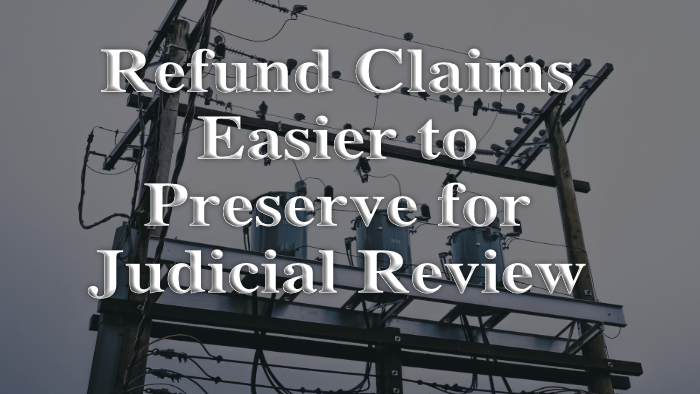A Texas appellate court sitting en banc recently made it easier for taxpayers to preserve refund claims for judicial review by quoting the relevant subsection(s) of the manufacturing exemption statute and including supporting documentation identifying the equipment and transactions at issue.
El Paso Electric Company (“El Paso”) seeks refund of sales tax paid in error on exempt manufacturing equipment.
El Paso is a fully integrated public utility in the business of manufacturing, generating, transmitting, and distributing electricity in west Texas and southern New Mexico. Hegar v. El Paso Electric Company, No. 03-18-00790-CV (Tex. App.—Austin Aug. 13, 2020, no pet. h.) (majority opinion). El Paso filed an administrative sales tax refund claim for different types of equipment under a variety of sales tax exemptions. Of the $5.1 million total refund El Paso sought, the Comptroller agreed to refund over $2.5 million.
The Comptroller would not agree to refund sales tax El Paso allegedly paid in error on the purchase of meters and disconnect collars that El Paso believed were exempt because they were “telemetry units related to step-down transformers,” a specific type of exempt manufacturing equipment. Tex. Tax Code § 151.318(a)(4). After the Comptroller denied El Paso’s administrative refund claim, El Paso filed a district court lawsuit. The Comptroller moved to dismiss the district court suit, arguing that the statement of grounds filed in El Paso’s earlier administrative refund claim failed to adequately put the Comptroller “on notice” of El Paso’s claim for telemetry units related to step-down transformers.
What does it mean to put the Comptroller “on notice” of a claim?
Taxpayers must comply with Section 111.104 of the Texas Tax Code to properly bring a refund claim. Specifically, refund claims must “state fully and in detail each reason or ground on which the claim is founded.” Tex. Tax. Code § 111.104(c)(2). As the appellate court explained, this language “require[s] the taxpayer to state the ‘reason or ground’ in such a way as to put the Comptroller on notice of the legal basis of the claim.” Hegar v. El Paso Electric Company, 629 S.W.3d 518, 526 (Tex. App.—Austin 2021, no pet. h.) (majority opinion).
El Paso put the Comptroller on notice of its claim by quoting the relevant subsection of the manufacturing exemption statute and including schedules identifying specific line-item transactions to which the exemption applied.
El Paso’s original administrative filing identified the refund claim by citing and quoting in full the subsection of the manufacturing exemption statute that contains a long list of exempt support equipment, including the “telemetry units related to step-down transformers”
El Paso also cited and quoted in full other subsections of the manufacturing exemption statute and various other provisions of the tax code. In addition, El Paso included schedules that “identif[ied] specific transactions involving ‘meters’ by line items that included detailed information about the particular transaction including dates, invoice numbers, and amounts and specifically refer[red] to manufacturing exemption ….”
Although two dissenting justices would have found that merely quoting the statute and listing the transactions on supporting schedules was insufficient to adequately put the Comptroller on notice of the nature of the taxpayer’s claim, the majority found otherwise. The Court concluded that El Paso had adequately invoked the court’s jurisdiction over its refund claim for telemetry units by quoting the entire manufacturing exemption statutory subsection at issue and by listing the meters (which constituted exempt telemetry units) in its schedules of transactions submitted with its administrative filings.
Taxpayers seeking refunds can preserve judicial review of their claims by broadly quoting the manufacturing exemption statute—but should not be too zealous with this approach.
The takeaway point from the El Paso case is that the court has made it easier to preserve claims for judicial review by endorsing broad quotations of the relevant subsection of the manufacturing exemption. So long as the equipment at issue is included in the subsection—even if buried in a wall of text—that is sufficient to put the Comptroller on notice of the legal ground for a refund claim (assuming the taxpayer also includes supporting documentation identifying the equipment and transactions at issue).
A practical consequence of this approach is that if a taxpayer owns manufacturing equipment that might fall under various portions of a subsection of the manufacturing exemption, neither the taxpayer nor its advisors need waste time at the initial stages of preparing the refund claim deciding which definition is most apt. The taxpayer or advisor can simply quote the entire subsection and still preserve judicial review.
Nevertheless, taxpayers and advisors should not be flippant when quoting the manufacturing exemption statute. While the court approved El Paso’s quotation of a long subsection of the manufacturing exemption statute, if a taxpayer or advisor quoted the entire manufacturing exemption statute without any further guidance to the Comptroller on which subsections apply, a court could find that situation sufficiently distinguishable from the El Paso case. The best practice would be to quote the specific subsections that the taxpayer or advisor believes could apply.
Note also that the time for the Comptroller to file an appeal to the Texas Supreme Court in the El Paso case has not expired. The Comptroller may seek further judicial review.
CPAs and other tax professionals unclear on how broadly to quote the manufacturing exemption statute in a refund claim are welcome to call or email members of our firm for a courtesy consultation to get our thoughts. Such consultation does not, and is not intended to, constitute legal advice.

